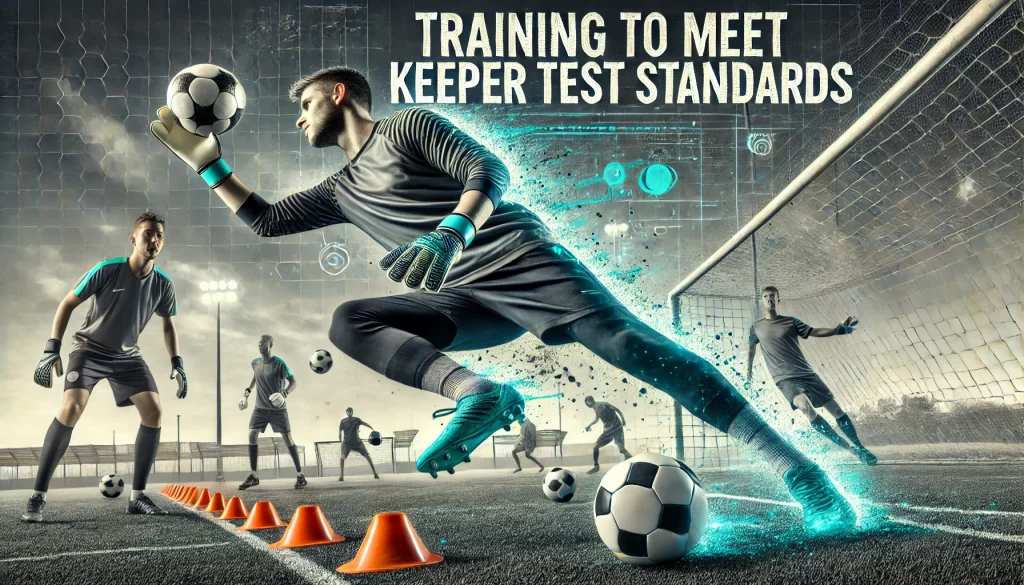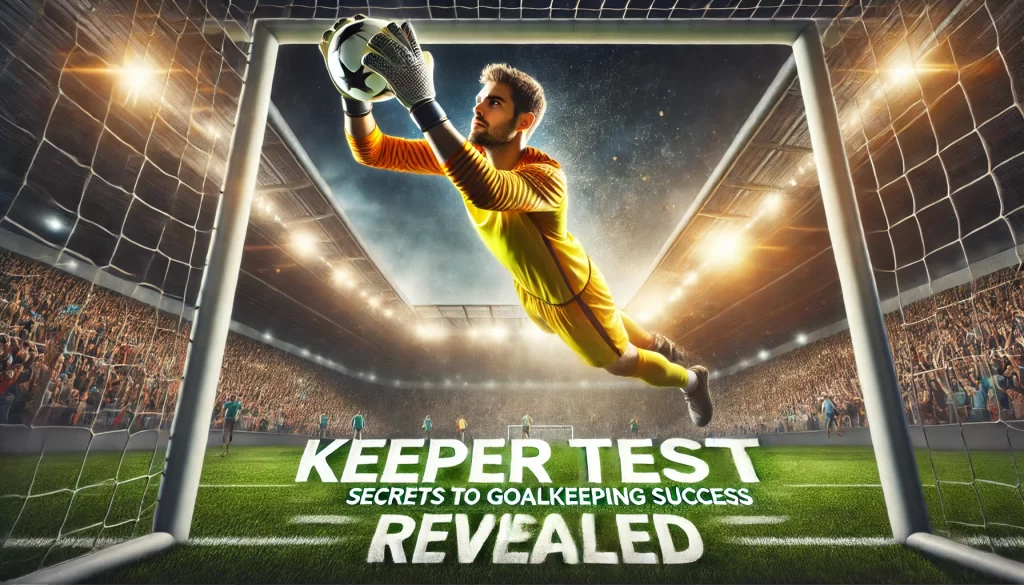Goalkeeping is a crucial position in soccer, requiring unique skills and standards. Understanding keeper test standards can significantly improve your performance, whether you’re an aspiring goalkeeper or a seasoned player. This article will delve into the secrets of goalkeeping success through well-defined keeper test standards.
Understanding Keeper Test Standards
Keeper test standards are the criteria used to evaluate a goalkeeper’s performance. These tests assess various aspects of goalkeeping, including physical fitness, technical skills, and mental toughness.
Physical Fitness Standards
Physical fitness is the foundation of a goalkeeper’s performance. Keeper test standards for physical fitness typically include:
- Agility Tests measure a goalkeeper’s ability to move quickly and change direction. Agility is vital for reacting to sudden changes during the game.
- Endurance Tests assess stamina and the ability to maintain performance throughout a match. A goalkeeper must be ready for action at any moment.
- Strength Tests evaluate the upper and lower body strength necessary for decisive saves. Strong muscles help in making those crucial dives and blocks.
Technical Skill Standards
Technical skills are crucial for effective goalkeeping. Keeper test standards for technical skills often cover the following:
- Diving Techniques: Proper diving techniques are essential for making saves. Tests evaluate the accuracy and speed of dives, ensuring goalkeepers can reach the ball efficiently.
- Catching and Punching: These skills are tested to ensure the goalkeeper can effectively handle the ball. Secure catching prevents rebounds that can lead to goals.
- Distribution: This includes throwing and kicking accuracy, which is vital for starting attacks. A good distribution can turn defense into offense quickly.
Mental Toughness Standards
Goalkeeping requires a strong mental attitude. Keeper test standards for mental toughness include:
- Decision Making: Quick and accurate decision-making is critical under pressure. A goalkeeper must decide whether to stay on the line or charge forward.
- Concentration: Maintaining focus throughout the game is essential for success. Goalkeepers must be alert even when the ball is far away.
- Resilience: The ability to recover from mistakes and maintain confidence is tested. A resilient goalkeeper shakes off errors and stays strong.
Training to Meet Keeper Test Standards

Meeting keeper test standards requires dedicated training. Here are some tips to help you succeed.
Physical Fitness Training
- Agility Drills: Incorporate ladder drills and cone exercises to improve agility. These drills mimic the quick movements needed during a game.
- Endurance Workouts: Engage in interval training and long-distance running to build stamina. Being fit ensures you’re ready for the full 90 minutes.
- Strength Training: Focus on compound exercises like squats and bench presses to enhance strength. Strong muscles help in making those decisive saves.
Technical Skills Training
- Diving Drills: Practice different diving techniques to improve accuracy and speed. Use soft mats to practice landings and reduce injury risk.
- Catching and Punching Practice: Work on hand-eye coordination and practice with different types of balls. High-speed drills help in catching fast shots.
- Distribution Exercises: Practice throwing and kicking to specific targets to improve accuracy. Aim for different distances to simulate game scenarios.
Mental Toughness Training
- Decision-Making Scenarios: Simulate game situations to improve decision-making skills. Set up scenarios where you must choose the best action quickly.
- Focus Exercises: Practice mindfulness and concentration techniques to enhance focus. Simple exercises like focusing on a point help maintain concentration.
- Resilience Building: Learn from mistakes and develop a positive mindset to maintain confidence. Reflect on past games to identify areas for mental improvement.
Advanced Tips for Goalkeeping Success
Beyond basic training, advanced strategies can help goalkeepers excel.
Positioning and Footwork
- Proper Positioning: Always position yourself correctly about the ball and goal. Good positioning reduces the goal area attackers can target.
- Effective Footwork: Quick and precise footwork helps in reaching the ball faster. Practice shuffling and sidestepping to improve your movements.
Communication Skills
- Vocal Leadership: A goalkeeper must communicate effectively with the defense. Clear instructions help organize the team and prevent mistakes.
- Reading the Game: Anticipate the opponent’s moves and communicate potential threats. Being vocal and aware can prevent many goal-scoring opportunities.
Continual Learning
- Watch and Learn: Study professional goalkeepers and learn from their techniques. Analyzing their games can provide new insights.
- Seek Feedback: Regularly seek feedback from coaches and teammates. Constructive criticism helps identify and improve weaknesses.
- Stay Updated: Keep up with new training methods and technologies. Staying informed helps in adopting effective techniques and tools.
Common Mistakes to Avoid
Understanding common mistakes can help you avoid pitfalls in your goalkeeping journey.
Neglecting Physical Fitness
Physical fitness is crucial for goalkeeping success. Neglecting fitness can lead to poor performance and injuries. Ensure you maintain a consistent fitness routine.
Ignoring Technical Skills
Technical skills are the backbone of goalkeeping. You must practice these skills to avoid missed saves and poor ball handling. Dedicate time to hone your technical abilities.
Overlooking Mental Toughness
Mental toughness is often overlooked but is vital for handling pressure. Ignoring this aspect can lead to poor decision-making and loss of confidence. Build mental resilience through regular practice and positive reinforcement.
Benefits of Meeting Keeper Test Standards
Meeting keeper test standards offers numerous benefits for goalkeepers.
Improved Performance
Achieving these standards can significantly enhance your performance on the field, leading to more successful saves and better overall play. You become more reliable and effective.
Increased Confidence
Knowing that you meet the standards boosts your confidence, helping you perform better under pressure. Confidence in your abilities translates to better game performance.
Career Advancement
Meeting keeper test standards can open doors for career opportunities, including selections for higher-level teams and professional contracts. Coaches and scouts look for players who meet high standards.
Real-Life Success Stories
Hearing from successful goalkeepers can inspire and guide you.
Professional Insights
- Manuel Neuer: Known for his sweeper-keeper style, Neuer emphasizes the importance of quick decision-making and accurate distribution.
- Hope Solo: Solo’s career showcases the value of mental toughness and resilience. She bounced back from setbacks and maintained top performance levels.
Amateur Achievements
- Local Heroes: Many local goalkeepers have reached high levels by adhering to keeper test standards. Their dedication to fitness, skills, and mental toughness set them apart.
Tools and Resources
Utilize available tools and resources to aid your training.
Training Equipment
- Rebounders: These help practice saving and improve reflexes.
- Agility Ladders: Useful for enhancing footwork and agility.
Digital Resources
- Apps and Videos: Many apps provide goalkeeping drills and techniques. Videos from professionals offer visual guidance.
- Online Courses: Enroll in online courses to learn advanced goalkeeping techniques.
Also Read: Abraham Quiros Villalba: Inspiring Journey and Remarkable Achievements
Final Thoughts
Keeper test standards are essential for any aspiring goalkeeper. Understanding and meeting these standards can unlock the secrets to goalkeeping success. Remember to focus on physical fitness, technical skills, and mental toughness in your training. By avoiding common mistakes and striving to meet these standards, you can improve your performance, increase your confidence, and advance your career. Embrace these keeper test standards, and watch your goalkeeping abilities soar.
Incorporating keeper test standards into your training regimen helps you reach your potential and sets you apart from the competition. Start today, stay consistent, and aim high. Your journey to goalkeeping success begins with meeting these essential standards.



